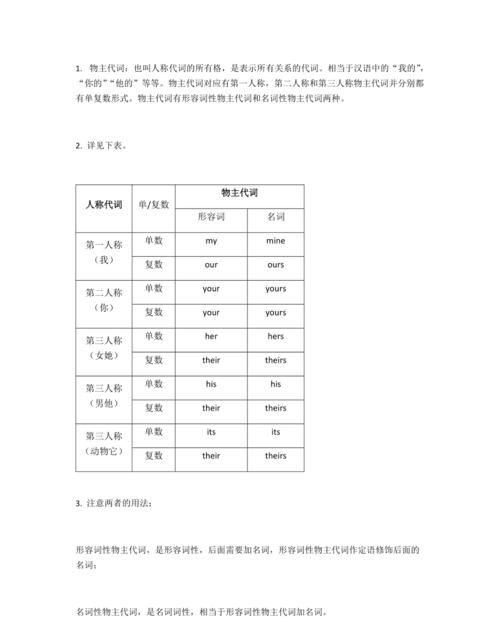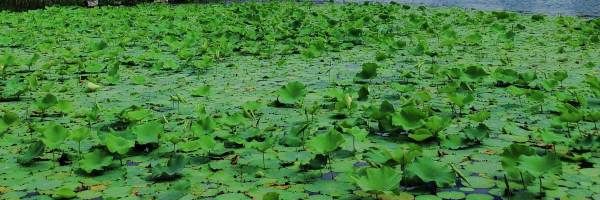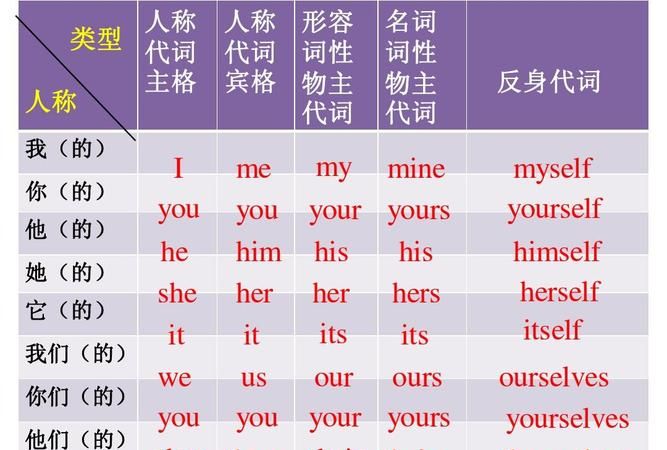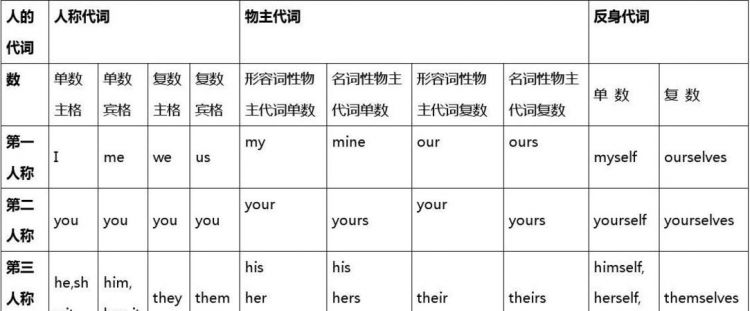本文目录
英语中哪些代词表示反身代词的用法
英语中的反身代词大都以-self(单数)或-selves(复数)结尾。
第一、二人称的反身代词由物主代词加-self构成。
第三人称的反身代词由代词宾格加-self构成。反身代词有三种不同的用法:
一、非强调用法
这种用法通常表示反身代词与句中的主语是同一人。它在句中作宾语,不能省略,否则该句是一个意义不完整的错句。例如:
(1)Jane is too young to look after herself.(简年纪太小,以至于不能照看自己)
(2)I teach myself English.(我自学英语)
(3)He didn't hurt himself, thank goodness.(他未伤了他自己,谢天谢地。)
二、强调用法
反身代词在强调用法中表示强调,即用来加强某个名词或者代词的语气,可译成“亲自”、“本人”。此时,它在句中作同位语。即使去掉,也不影响句子的完整性。例如:
(1)You must do it yourself.(你必须自己做)
(2)I myself did the homework last night。(昨晚是我自己做了家庭作业)
三、与by搭配
当反身代词与by搭配时,意为:单独地,没有人帮助的。例如:
(1)We must finish it all by ourselves.(我们必须全靠自己去完成。)
(2)He can swim all by himself.(他能独自一个人游泳。)

反身代词有哪些
1. 问题解答: 反身代词又称自身代词,是一种表示反身或强调的代词。通过反身代词,可以指代主语,使句子的施动者把动作在形式上反射到施动者自己。
2. 语法解释: 英语中表示反身或强调的代词叫做反身代词,也称作自身代词。反身代词是由第一人称、第二人称形容词性物主代词或第三人称代词宾格形式,词尾加self(单数含义)或者selves(复数含义)组成。反身代词可以翻译为“本人、本身”,用来加强语气,也常常翻译为“亲自、自己”。应中常见的反身代词有以下几个: myself, ourselves, yourself, yourselves, himself, herself, itself, themselves以及oneself。反身代词在句中可以做宾语、表语或者做主语或宾语的同位语。有时反身代词也可以做句子的主语,不过这种情况比较少见。
3. 典型例句:
① I can't express myself in english. 我不能用英语表达思想。(宾语)
② That poor boy was myself. 那个可怜的男孩就是我自己。(表语)
③ He himself was a doctor.他本人就是一个大夫。(主语的同位语)
④ Both my sister and myself asked to go and work there. 妹妹和我都要求到那里去工作。(主语)

英语中的反身代词有哪些用法 说清楚
释义
反身代词是一种表示反射或强调的代词.它的基本含义是:通过反身代词指代主语,使施动者把动作在形式上反射到施动者自己.因此,反身代词与它所指代的名词或代词形成互指关系,在人称、性、数上保持一致.
如:
(1)A marked bee fed itself from the dish and returned to the hive.
一只做了标记的蜜蜂从盘中喂饱自己以后就飞回蜂箱了(itself 与 bee 在人称、性、数上保持一致)
(2)In 1955 Walt Disney himself opened the first Disney park.
1955年,沃尔特.迪斯尼亲自创办了第一个迪斯尼公园.(himself 与 Walt Disney 在人称、性、数上保持一致)
反身代词和人称代词作宾语时具有不同的含义.
如:
(3)He saw himself in the mirror.
他在镜子里看见了他自己.(himself 和 he 为同一人)
(4)He saw him in the mirror.
他在镜子里看见了他.(him 显然指另外一人)
常见的反身代词列表:
I--myself you-- yourself your-- yourselves she--herself he
himself
we they it one
ourselves themselves itself oneself
用法
1)做宾语
a. 有些动词需有反身代词
absent, bath, amuse, blame, dry, cut, enjoy, hurt, introduce, behave
We enjoyed ourselves very much last night. 我们昨晚玩得很开心.
Please help yourself to some fish. 请你随便吃点鱼.
b. 用于及物动词+宾语+介词
take pride in, be annoyed with, help oneself to sth.
I could not dress (myself) up at that time. 那个时候我不能打扮我自己.
注:有些动词后不跟反身代词, get up, sit-down, stand up, wake up等.
Please sit down. 请坐.
2) 作表语; 同位语
be oneself: I am not myself today. 我今天不舒服.
The thing itself is not important. 事情本身并不重要.
3) 在不强调的情况下,but, except, for 等介词后宾语用反身代词或人称代词宾格均可.如:
No one but myself (me) is hurt.
注意:
a. 反身代词本身不能单独作主语.
(错) Myself drove the car.
(对) I myself drove the car. 我自己开车.
b. 但在and, or, nor连接的并列主语中,第二个主语可用反身代词,特别是myself 作主语.
Charles and myself saw it.
5)第二人称作宾语,要用反身代词.
You should be proud of yourself. 你应为自己感到骄傲.
myself-第一人称单数,我自己
ourselves-第一人称复数,我们自己
yourself-第二人称单数,你自己
yourselves-第二人称复数,你们自己
himself/herself/itself-第三人称单数,他/她/它自己
1) 列表
数 单数 复数
人称 第一人称 第二人称 第三人称 第一 人称 第二人称 第三人称
人称代词 I you he/she/it we you they
反身代词 myself yourself yourself/herself/himself ourselves yourselves themselves
另外:one的反身代词为oneself
2)做宾语
a. 有些动词需有反身代词,如absent, bathe, amuse, blame, dry, cut, enjoy, hurt, introduce, behave等.例如:
We enjoyed ourselves very much last night. 我们昨晚玩得很开心.
Please help yourself to some fish. 请你随便吃点鱼.
b. 用于及物动词+宾语+介词,如take pride in, be annoyed with, help oneself to sth等.例如:
I could not dress(myself)up at that time. 那个时候我不能打扮我自己.
注:有些动词后不跟反身代词,如:get up, sit-down, stand up, wake up等.例如:
Please sit down. 请坐.
3) 用作表语,如结构be oneself.例如:
I am not myself today. 我今天不舒服.
4) 用作同位语
The thing itself is not important. 事情本身并不重要.
5) 在不强调的情况下,but, except, for 等介词后宾语用反身代词或人称代词宾格均可.如:No one but myself(me)is hurt.
注意:
a. 反身代词本身不能单独作主语.
(错) Myself drove the car.
(对) I myself drove the car. 我自己开车.
b. 但在and, or, nor连接的并列主语中,第二个主语可用反身代词,特别是myself 作主语.例如:
Charles and myself saw it. 查尔斯和我看见了这件事.
D.反身代词
定义 人称代词的宾格或所有格词尾加“-self,-selves”的代词称为反身代词(Reflexive Pronoun),亦称复合人称代词(Compound Personal Pronoun).
反身代词的用法
(1)反身用法:及物动词的宾语即为主语本身的用法叫作反身用法.
例A:The old man killed himself last night.
(那个老人昨夜自杀了.)
例B:We enjoyed ourselves very much at the party last night.
(昨夜我们在宴会中过得很愉快.)
例C:Help yourselves,please.
(请各位不要客气.)
解说 如各例句所示,各反身代词都是指其主语本身.这种用法有些已成为惯用表达法(例B),例如:
例:He absented himself from school this morning.
(他今天早晨缺席,没有到学校.)
例:She seated herself by the window.
(她拣了窗边的一个座位坐下来.)
例:I was late this morning because I overslept myself.
(今天早晨我迟到是因为我睡过头了.)
例:Don't overeat yourself,or you'll get sick.
(不要暴食,否则你会生病的)
例:They dressed themselves up quickly and left the house.
(他们匆匆地穿好衣服后就出去了.)
(2)作介词的宾语用:也是属于反身用法.
例A:The door opened of itself.
(门自动地开了.)
例B:I like to travel by myself.
(我喜欢独自旅行.)
例C:She was beside herself with grief.
(她悲伤过度,神经失常了.)
解说 例A的“of itself”是表示无外力干予,即“自动”的意思.例B的“by myself”是表示无外人参加,即“独自”的意思.例C的“beside herself”是表示脱离她本来的自我,即“失常,发疯”的意思.
(3)表达强调
例:I myself heard him say so yesterday.
(我昨天亲自听他这么说的.)
例:she did it herself.(=She herself did it.)
(她自己做的.)
例:The story itself is not interesting.
(故事本身并不令人感到有趣

反身代词他们自己用英语怎么说
反身代词的用法:
1、 反身代词不能作主语,但是它可以作主语同位语,放在主语后或句末.:如:我亲自去了电影院.误:Myself went to the cinema.正:I went to the cinema myself.
2、 反身代词可以作宾语的同位语.如:I wish I could hear Beethoven himself play this music.我希望我能听贝多芬他亲自弹这首曲子.You can go and ask him himself.你可以去问他本人.
3、 反身代词可以作介词的宾语.如:Nobody, she learnt it all by herself.没人,她自学的.I mended the bike by myself.我独自修的自行车.She said to herself: ”what’s wrong with my eyes?”她自言自语地说,“我的眼睛怎么啦?”Don’t always think of yourself.别总是想着你自己.
4、 反身代词作动词的宾语.一般放在像这样的动词的后面:enjoy, help, hurt, teach, wash, look after, get dressed, buy等.如:Did you enjoy yourselves at the weekend? 你们周末玩得开心吗?He teaches himself English at home.他在家自学英语. “Help yourselves to some fish .children.”“ 孩子们,随便吃一些鱼 .” He can buy himself a lot of nice things.他可以给自己买好多好东西.
5、反身代词可以作表语.如:I’m not quite myself today.我今天情绪不好.He doesn’t seem himself this morning.今天上午他似乎不舒服.

以上就是关于独自英语反身代词 ,英语中哪些代词表示反身代词的用法的全部内容,以及独自英语反身代词 的相关内容,希望能够帮到您。

